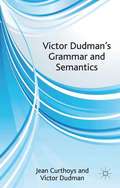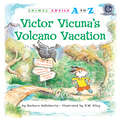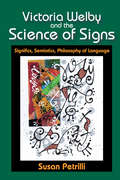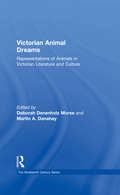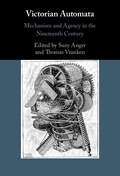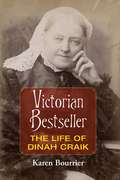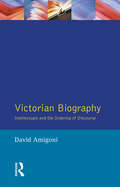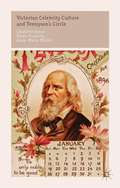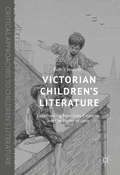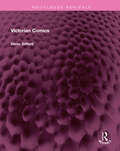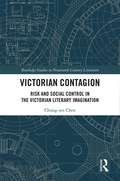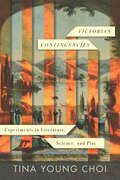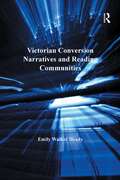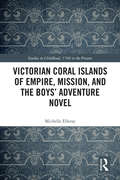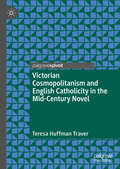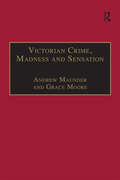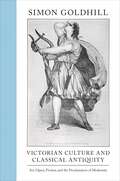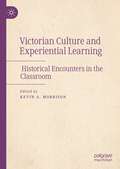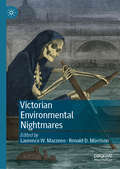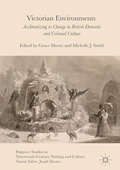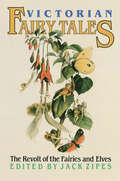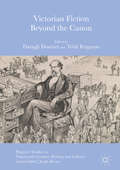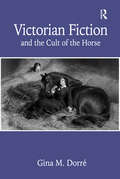- Table View
- List View
Victor Dudman’s Grammar and Semantics
by Jean Curthoys Victor H. DudmanVictor Dudman's revolutionary English Grammar brings grammar and logic together by conceiving grammar as 'the necessary preliminary to logic'. The focus, for logicians, is the discussion of 'conditionals'; for grammarians it is the concise and accurate explanation of the infamous English modals.
Victor Hugo, Jean-Paul Sartre, and the Liability of Liberty
by Bradley Stephens"The arch-Romantic Victor Hugo (1802-85) and the Existentialist philosopher Jean-Paul Sartre (1905-80) are widely perceived to have little in common beyond their canonical status. However, responding to Sartre's often overlooked fascination with Hugo, Bradley Stephens cuts through generic divisions to argue that significant parallels between the two writers have been neglected. Stephens argues that both Hugo and Sartre engage with human beings in distinctly non-ontological terms, thereby anticipating postmodernist approaches to human experience. From different origins but towards similar realisations, they expose the indeterminate human condition as at once release and restriction. These writers insist that liberty is not simply a political ideal, but an existential condition which engages human endeavour as a dynamic rather than definitive mode of being. This incisive new book affirms the ongoing relevance of the two most iconic French writers of the modern period to contemporary discourse on what it means to be free."
Victor Hugo, Romancier de l'Abime: New Studies on Hugo's Novels
by James Hiddleston"This study of Victor Hugo's work aims to uncover the diversity, the thematic and narrative singularity, and the shifting ironies and resistance to interpretative closure of his writing. Novels examined include: ""Notre-Dame de Paris"", ""Les Miserables"", ""Les Travailleurs de la Mer"", ""Quatre vingt-treize"", and ""L'Homme qui Rit"". The 11 essays in the volume bring together various critical approaches from French, British and American scholars, in an attempt to provide a new point of departure and to provoke discussion of Victor Hugo's novels. This publication marks the bicentenary of Hugo's birth in 1802."
Victor Vicuna's Volcano Vacation (Animal Antics A to Z)
by Barbara deRubertisShiver River, Vampire Cave, Stove-Top Volcano, and a mysterious raven named Nevva Moore. . . . Victor Vicuna is in for some very exciting adventures during his family’s vacation at Verna Aardvark’s Volcano Village!
Victoria Welby and the Science of Signs: Significs, Semiotics, Philosophy of Language
by Susan PetrilliVictoria Welby (1837–1912) dedicated her research to the relationship between signs and values. She exchanged ideas with important exponents of the language and sign sciences, such as Charles S. Peirce and Charles S. Ogden. She examined themes she believed crucially important both in the use of signs and in reflection on signs. But Welby's research can also be understood in ideal dialogue with authors she could never have met in real life, such as Mikhail Bakhtin, Susanne Langer, and Genevieve Vaughan.Welby contends that signifying cannot be constrained to any one system, type of sign, language, field of discourse, or area of experience. On the contrary, it is ever more developed, enhanced, and rigorous, the more it develops across different fields, disciplines, and areas of experience. For example, to understand meaning, Welby evidences the advantage of translating it into another word even from the same language or resorting to metaphor to express what would otherwise be difficult to conceive.Welby aims for full awareness of the expressive potential of signifying resources. Her reflections make an important contribution to problems connected with communication, expression, interpretation, translation, and creativity.
Victorian Animal Dreams: Representations of Animals in Victorian Literature and Culture (The Nineteenth Century Series)
by Deborah Denenholz MorseThe Victorian period witnessed the beginning of a debate on the status of animals that continues today. This volume explicitly acknowledges the way twenty-first-century deliberations about animal rights and the fact of past and prospective animal extinction haunt the discussion of the Victorians' obsession with animals. Combining close attention to historical detail with a sophisticated analytical framework, the contributors examine the various forms of human dominion over animals, including imaginative possession of animals in the realms of fiction, performance, and the visual arts, as well as physical control as manifest in hunting, killing, vivisection and zookeeping. The diverse range of topics, analyzed from a contemporary perspective, makes the volume a significant contribution to Victorian studies. The conclusion by Harriet Ritvo, the pre-eminent authority in the field of Victorian/animal studies, provides valuable insight into the burgeoning field of animal studies and points toward future studies of animals in the Victorian period.
Victorian Automata: Mechanism and Agency in the Nineteenth Century
by Suzy Anger Thomas VrankenThe relationship between lifelike machines and mechanistic human behaviour provoked both fascination and anxiety in Victorian culture. This collection is the first to examine the widespread cultural interest in automata – both human and mechanical – in the nineteenth century. It was in the Victorian period that industrialization first met information technology, and that theories of physical and mental human automatism became essential to both scientific and popular understandings of thought and action. Bringing together essays by a multidisciplinary group of leading scholars, this volume explores what it means to be human in a scientific and industrial age. It also considers how Victorian inquiry and practices continue to shape current thought on race, creativity, mind, and agency. This title is part of the Flip it Open programme and may also be available Open Access. Check our website Cambridge Core for details.
Victorian Bestseller: The Life of Dinah Craik
by Karen BourrierWhen novelist Dinah Craik (1826–87) died, expressions of grief came from Lord Alfred Tennyson, Matthew Arnold, Robert Browning, T.H. Huxley, and James Russell Lowell, among others, and even Queen Victoria picked up her pen to offer her consolation to the widower. Despite Craik’s enormous popularity throughout a literary career that spanned forty years, she is now all but forgotten. Yet, in an otherwise respectable life bookended by scandal, this was precisely the way that she wanted it. Victorian Bestseller is the first book to relate the story of Dinah Craik’s remarkable life. Combining extensive archival work with theoretical work in disability studies and the professionalization of women’s authorship, Karen Bourrier engagingly traces the contours of this author’s life. Craik, who wrote extensively about disability in her work, was no stranger to it in her personal and professional life, marked by experiences of mental and physical disability, and the ebb and flow of health. Following scholarship in the ethics of care and disability studies, the book posits Craik as an interdependent subject, placing her within a network of writers, publishers, editors and artists, friends, and family members. Victorian Bestseller also traces the conditions in the material history of the book that allowed Victorian women writers’ careers to flourish. In doing so, the biography connects corporeality, gender, and the material history of the book to the professionalization of Victorian women’s authorship.
Victorian Biography: Intellectuals and the Ordering of Discourse
by David AmigoniThis book rethinks Victorian biography and some of its major practitioners from the perspectives of Bakhtinian and Foucauldian discourse theory. A re-reading of the writings of Thomas Carlyle, particularly "Sartor Resartus" and Oliver Cromwell's "Letters and Speeches", provides the basis for the central argument of the book: that the biographical writings of late-19th-century figures such as John Morley, Frederick Harrison, Leslie Stephen, and J.R. Seeley need to be seen as an argument against Carlyle's writing practices, and as an attempt to impose cultural discipline on reading practices. The book contends that biography is a key genre for understanding debates between 19th-century intellectuals about the circulation and use of "literary" and "historical" discourse. As such, it is also a timely intervention in the current debate about the emergence of the disciplines of "literature" and "history" in the 19th century.
Victorian Celebrity Culture and Tennyson’s Circle
by Charlotte Boyce Páraic Finnerty Anne-Marie MillimTennyson experienced at first hand the all-pervasive nature of celebrity culture. It caused him to retreat from the eyes of the world. This book delineates Tennyson's reluctant celebrity and its effects on his writings, on his coterie of famous and notable friends and on the ever-expanding, media-led circle of Tennyson's admirers.
Victorian Children’s Literature
by Ruth Y. JenkinsThis book reveals how the period's transforming identities affected by social, economic, religious, and national energies offers rich opportunities in which to analyze the relationship between identity and transformation. At the heart of this study is this question: what is the relationship between Victorian children's literature, its readers, and their psychic development? Ruth Y. Jenkins uses Julia Kristeva's theory of abjection to uncover the presence of cultural anxieties and social tensions in works by Kingsley, MacDonald, Carroll, Stevenson, Burnett, Ballantyne, Nesbit, Tucker, Sewell, and Rossetti.
Victorian Comics (Routledge Revivals)
by Denis GiffordThe Victorians are usually painted as prim, proper and repressed. Yet it was in Victoria’s Britain that the comic paper was born and her subjects eagerly devoured their ‘Penny Dreadfuls’ and ‘Comic Cuts’. Originally published in 1976, this first ever compilation of Victorian comics is culled from England’s largest collection by its curator Denis Gifford. In these pages many forgotten figures of fun (such as Ally Sloper, Chokee Bill, Airy Alf and Bouncing Billy) live again, not to mention such notorious episodes as the assault on the Albert Memorial by the Ball’s Pond Banditti and the capture of Pretoria by Weary Willie and Tired Tim. This book is a re-issue originally published in 1976 and contains comics from the Victorian era. The language used is therefore a reflection of its time and no offence is meant by the Publishers to any reader by this re-publication.
Victorian Contagion: Risk and Social Control in the Victorian Literary Imagination (Routledge Studies in Nineteenth Century Literature)
by Chung-jen ChenVictorian Contagion: Risk and Social Control in the Victorian Literary Imagination examines the literary and cultural production of contagion in the Victorian era and the way that production participated in a moral economy of surveillance and control. In this book, I attempt to make sense of how the discursive practice of contagion governed the interactions and correlations between medical science, literary creation, and cultural imagination. Victorians dealt with the menace of contagion by theorizing a working motto in claiming the goodness and godliness in cleanliness which was theorized, realized, and radicalized both through practice and imagination. The Victorian discourse around cleanliness and contagion, including all its treatments and preventions, developed into a culture of medicalization, a perception of surveillance, a politics of health, an economy of morality, and a way of thinking. This book is an attempt to understands the literary and cultural elements which contributed to fear and anticipation of contagion, and to explain why and how these elements still matter to us today.
Victorian Contingencies: Experiments in Literature, Science, and Play
by Tina Young ChoiContingency is not just a feature of modern politics, finance, and culture—by thinking contingently, nineteenth-century Britons rewrote familiar narratives and upended forgone conclusions. Victorian Contingencies shows how scientists, novelists, and consumers engaged in new formal and material experiments with cause and effect, past and present, that actively undermined routine certainties. Tina Young Choi traces contingency across a wide range of materials and media, from newspaper advertisements and children's stories to well-known novels, scientific discoveries, technological innovations. She shows how Charles Lyell and Charles Darwin reinvented geological and natural histories as spaces for temporal and causal experimentation, while the nascent insurance industry influenced Charles Babbage's computational designs for a machine capable of responding to a contingent future. Choi pairs novelists George Eliot and Lewis Carroll with physicist James Clerk Maxwell, demonstrating how they introduced possibility and probability into once-assured literary and scientific narratives. And she explores the popular board games and pre-cinematic visual entertainments that encouraged Victorians to navigate a world made newly uncertain. By locating contingency within these cultural contexts, this book invites a deep and multidisciplinary reassessment of the longer histories of causality, closure, and chance.
Victorian Conversion Narratives and Reading Communities
by Emily Walker HeadyBecause Victorian authors rarely discuss conversion experiences separately from the modes in which they are narrated, Emily Walker Heady argues that the conversion narrative became, in effect, a form of literary criticism. Literary conventions, in turn, served the reciprocal function as a means of discussing the nature of what Heady calls the 'heart-change.' Heady reads canonical authors such as John Henry Newman, Charles Dickens, Charlotte Brontë, George Eliot, and Oscar Wilde through a dual lens of literary history and post-liberal theology. As Heady shows, these authors question the ability of realism to contain the emotionally freighted and often jarring plot lines that characterize conversion. In so doing, they explore the limits of narrative form while also shedding light on the ways in which conversion narratives address and often disrupt the reading communities in which they occur.
Victorian Coral Islands of Empire, Mission, and the Boys’ Adventure Novel (Studies in Childhood, 1700 to the Present)
by Michelle EllerayAttending to the mid-Victorian boys’ adventure novel and its connections with missionary culture, Michelle Elleray investigates how empire was conveyed to Victorian children in popular forms, with a focus on the South Pacific as a key location of adventure tales and missionary efforts. The volume draws on an evangelical narrative about the formation of coral islands to demonstrate that missionary investments in the socially marginal (the young, the working class, the racial other) generated new forms of agency that are legible in the mid-Victorian boys’ adventure novel, even as that agency was subordinated to Christian values identified with the British middle class. Situating novels by Frederick Marryat, R. M. Ballantyne and W. H. G. Kingston in the periodical culture of the missionary enterprise, this volume newly historicizes British children’s textual interactions with the South Pacific and its peoples. Although the mid-Victorian authors examined here portray British presence in imperial spaces as a moral imperative, our understanding of the "adventurer" is transformed from the plucky explorer to the cynical mercenary through Robert Louis Stevenson, who provides a late-nineteenth-century critique of the imperial and missionary assumptions that subtended the mid-Victorian boys’ adventure novel of his youth.
Victorian Cosmopolitanism and English Catholicity in the Mid-Century Novel
by Teresa Huffman TraverVictorian Cosmopolitanism and English Catholicity in the Mid-Century Novel argues that the Creedal doctrines of “the communion of saints” and the “holy Catholic Church” provided Victorian novelists—both Roman Catholic and Protestant—with a means of exploring religious forms of cosmopolitanism. Building on research exploring the divisions between Roman Catholicism and Protestantism in Victorian literature and culture, Teresa Huffman Traver considers the extent to which anti-Catholicism, domesticity, and national identity were linked. Huffman Traver connects this research with cosmopolitan theory, and analyzes how the conception of Catholicity could be used to reach beyond national identity towards a transnational community. Investigating the idea of a “rooted” cosmopolitanism, grounded in the local and limited in scope, this Pivot book offers a new angle on how religion, domesticity, and national identity were constructed in nineteenth-century British culture.
Victorian Crime, Madness and Sensation (The Nineteenth Century Series)
by Andrew MaunderBeginning with Victoria's enthronement and an exploration of sensationalist accounts of attacks on the Queen, and ending with the notorious case of a fin-de-siècle killer, Victorian Crime, Madness and Sensation throws new light on nineteenth-century attitudes toward crime and 'deviance'. The essays, which draw on both canonical and liminal texts, examine the Victorian fascination with criminal psychology and pathology, engaging with real life cases alongside fictional accounts by writers as diverse as Ainsworth, Stevenson, and Stoker. Among the topics are shifting definitions of criminality and the ways in which discourses surrounding crime changed during the nineteenth century, the literal and social criminalization of particular sex acts, and the gendering of degeneration and insanity. As fascinated as they were with criminality, the Victorians were equally concerned with solving crime, and this collection also focuses on the forces of law enforcement and nineteenth-century attempts to "read" the criminal body as revealed in Victorian crime fiction and reportage. Contributors engage with the detective figure and his growing professionalization, while examining the role of science and technology - both at home and in the Empire - in solving cases.
Victorian Culture and Classical Antiquity: Art, Opera, Fiction, and the Proclamation of Modernity (Martin Classical Lectures #29)
by Simon GoldhillHow did the Victorians engage with the ancient world? Victorian Culture and Classical Antiquity is a brilliant exploration of how the ancient worlds of Greece and Rome influenced Victorian culture. Through Victorian art, opera, and novels, Simon Goldhill examines how sexuality and desire, the politics of culture, and the role of religion in society were considered and debated through the Victorian obsession with antiquity. Looking at Victorian art, Goldhill demonstrates how desire and sexuality, particularly anxieties about male desire, were represented and communicated through classical imagery. Probing into operas of the period, Goldhill addresses ideas of citizenship, nationalism, and cultural politics. And through fiction--specifically nineteenth-century novels about the Roman Empire--he discusses religion and the fierce battles over the church as Christianity began to lose dominance over the progressive stance of Victorian science and investigation. Rediscovering some great forgotten works and reframing some more familiar ones, the book offers extraordinary insights into how the Victorian sense of antiquity and our sense of the Victorians came into being. With a wide range of examples and stories, Victorian Culture and Classical Antiquity demonstrates how interest in the classical past shaped nineteenth-century self-expression, giving antiquity a unique place in Victorian culture.
Victorian Culture and Experiential Learning: Historical Encounters in the Classroom
by Kevin A. MorrisonThis book is a crucial resource for instructors interested in bringing the past alive for their students through hands-on, immersive educational experiences. While sharing a common historical field, the contributors hail from multiple disciplines, including art history, human biology, biological anthropology, and English literature. Ranging from assignments that involve students editing and annotating a primary work to producing an array of digital projects, and from participating in study-abroad programs to taking part in service-learning initiatives, the chapters will furnish readers with strategies for creating engaged and dynamic classrooms. Although the focus of the book is on Victorian Britain, the pedagogical approaches outlined in each chapter will be useful to instructors of any historical field.
Victorian Environmental Nightmares
by Laurence W. Mazzeno Ronald D. MorrisonThe twelve essays in Victorian Environmental Nightmares explore various “environmental nightmares” through applied analyses of Victorian texts. Over the course of the nineteenth century, writers of imaginative literature often expressed fears and concerns over environmental degradation (in its wide variety of meanings, including social and moral). In some instances, natural or environmental disasters influenced these responses; in other instances a growing awareness of problems caused by industrial pollution and the growth of cities prompted responses. Seven essays in this volume cover works about Britain and its current and former colonies that examine these nightmare environments at home and abroad. But as the remaining five essays in this collection demonstrate, “environmental nightmares” are not restricted to essays on actual disasters or realistic fiction, since in many cases Victorian writers projected onto imperial landscapes or wholly imagined landscapes in fantastic fiction their anxieties about how humans might change their environments—and how these environments might also change humans.
Victorian Environments: Acclimatizing to Change in British Domestic and Colonial Culture (Palgrave Studies In Nineteenth-century Writing And Culture)
by Michelle J. Smith Grace MooreThis collection will draw attention to new ideas in both Victorian studies and in the emerging area of literature and the environment. Adopting a broad interpretation of the term ‘environment’ the work aims to draw together new approaches to Victorian texts and cultures that conceptualise and are influenced by environments ranging from rural to urban, British to Antipodean, and from the terrestrial to the aquatic.With the pressures of industrialism and the clustering of workers in urban centres, the Victorians were acutely aware that their environment was changing. Torn between nostalgia for a countryside that was in jeopardy and exhilaration at the rapidity with which their surroundings altered, the literature and culture produced by the Victorians reflects a world undergoing radical change. Colonization and assisted emigration schemes expanded the scope of the environment still further, pushing the boundaries of the ‘home’ on an unprecedented scale and introducing strange new worlds. These untamed physical environments enabled new freedoms, but also posed challenges that invited attempts to control, taxonomize and harness the natural world. Victorian Environments draws together leading and emerging international scholars for an examination of how various kinds of environments were constructed, redefined, and transformed, in British and colonial texts and cultures, with particular attention to the relationship between Australia and Britain.
Victorian Fairy Tales: The Revolt of the Fairies and Elves
by Jack ZipesFirst published in 1989. Routledge is an imprint of Taylor & Francis, an informa company.
Victorian Fiction Beyond the Canon
by Daragh Downes Trish FergusonThis book is about selected Victorian texts and authors that in many cases have never before been subject to sustained scholarly attention. Taking inspiration from the pioneeringly capacious approach to the hidden hinterland of Victorian fiction adopted by scholars like John Sutherland and Franco Moretti, this energetically revisionist volume takes advantage of recent large-scale digitisation projects that allow unprecedented access to hitherto neglected literary texts and archives. Blending lively critical engagement with individual texts and close attention to often surprising trends in the production and reception of prose fiction across the Victorian era, this book will be of use to anyone interested in re-evaluating the received meta-narratives of Victorian literary history. With an afterword by John Sutherland
Victorian Fiction and the Cult of the Horse
by Gina M. DorréThe horse was essential to the workings of Victorian society, and its representations, which are vast, ranging, and often contradictory, comprise a vibrant cult of the horse. Examining the representational, emblematic, and rhetorical uses of horses in a diversity of nineteenth-century texts, Gina M. Dorré shows how discourses about horses reveal and negotiate anxieties related to industrialism and technology, constructions of gender and sexuality, ruptures in the social fabric caused by class conflict and mobility, and changes occasioned by national "progress" and imperial expansion. She argues that as a cultural object, the horse functions as a repository of desire and despair in a society rocked by astonishing social, economic, and technological shifts. While representations of horses abound in Victorian fiction, Gina M. Dorré's study focuses on those novels by Charles Dickens, Elizabeth Braddon, Anna Sewell, and George Moore that engage with the most impassioned controversies concerning horses and horse-care, such as the introduction of the steam engine, popular new methods of horse-taming, debates over the tight-reining of horses, and the moral furor surrounding gambling at the race track. Her book establishes the centrality of the horse as a Victorian cultural icon and explores how through it, dominant ideologies of gender and class are created, promoted, and disrupted.
